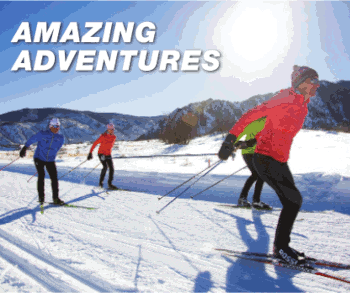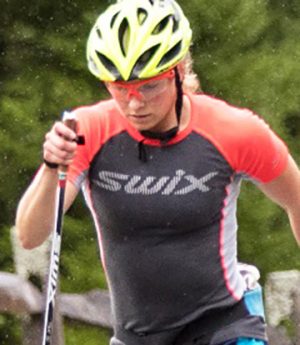And how about Russian, Liliya Stepanova, who asked another skier to go to doping control on her behalf? Is she so naïve (or dumb) to think that they won’t know what she looks like? Of course they caught the impersonator. This is Stepanova’s second time being nailed but she only gets a slap on the hand – two years – what a joke.
Jurg Capol, the FIS Director of Cross Country skiing, said he believes the penalty should be five years to have any meaning – read more here. I’ve been screaming for years that it should be a lifetime ban for any chance to eradicate drugs and doping. It’s time for the “officialdom” – FIS, WADA, IOC – to make this move because a 2-year ban is nothing more than an extended training period. Virpi Kuitinen, one of Finland’s top skiers since 1995, was caught in 2001, served her penalty of two years, and then skied for another seven years before retiring this spring. She was voted Finland’s Sports Women of the Year in 2007 so that tells you what her countryman think of her doping offences.
For the second time this year Russian President Dimtry Medvedev, has charged his country’s sport association leaders to put forward an effort to eradicate doping (see article), but please read these quotes from the article:
Medvedev said Russia needs to shed the image of a doping-tainted nation, but added that Russian athletes sometimes have been targeted unfairly. What? When you’re caught – you’re caught!
“Let’s not forget that doping scandals are to a certain extent an element of score-settling and an element of global sports competition,” Medvedev said. “We must know how to defend ourselves and not offer the other cheek.” When you’re caught – you’re caught!
He added that Russia must increase its profile in international sports organizations, saying Russian representatives haven’t been active enough in defending their athletes. How do you defend dopers?
Russian sports minister Vitaly Mutko said that from 2006 to 2009, a total of 343 Russian athletes, including 31 participants in international competitions, have been caught doping. This is the crux of the issue!
The number 343 clearly indicates that Russia has a systemic doping problem on their hands and Medvedev is simply doing what all good presidents do – posture. The country has gotten away with way too much doping, and posturing over the past 40 years and needs to finally address the problem.
Ski changing in North America
It seems that the officialdom here in North America hasn’t accepted that the FIS international ski world is now into its second year of allowing ski changes in distances races. The 2010 US Distance Nationals just hosted in Fort Kent, ME would have been an ideal time to give this new phase of the sport a try. Conditions were dicey, the fields were small, as executing this format can be a bit of a logistical nightmare, but not much more than the current schematics for a pursuit format – so what’s the hold up? The USSA/USST and CCC should announce that next year that any distances races on their national calendars will be open to this format if conditions so warrant. They need to post the rules, warn organizers about the logistical concerns, bring all TDs up to speed, and tell the skiers and their coaches how this works for all parties to be ready. Currently in North America we probably have 15 skiers total that have had this experience. It’s time to educate the masses and provide them with this race experience as it brings forward a whole set of new tactics and race strategies – way more in-race thinking. Let’s not wait any longer to catch up.
To The McKeevers
It has taken me over a month to cool down enough to write about this topic. To give Brian and Robin McKeever the benefit of the doubt they may have fallen into a media trap, but managing this side of sport at this level is still the responsibility of the athlete. By the end of the Games the media was looking to get, or create a story, they could sink their collective teeth into – as they always do – and someone put the McKeevers out there as the bait. The Olympics are about making history, but more important, they’re about producing results and winning medals. The McKeevers worked well with the “Own The Podium” program – that was their focus at the Paralympic Games and they were a perfect 3-for-3 in winning medals and also hit a grand slam because they were all gold. SUPER!
The history-making moment was when Brian McKeever was named to both the Olympic and Paralympic teams, and any opportunity to make more history had to be earned. Consider that at the special trial races in Canada McKeever was up against his teammates, while the four skiers also vying to race in the Olympic 50km were in Europe competing on the international circuit. To Brian’s credit he won the 50km tryout race and was named to the Canadian Cross Country Olympic Team – a fabulous achievement but not a guarantee that he would race at the Games.
For many skiers including McKeever, the final chance to claim a start at one of the Olympic races came one week prior at the World Cup in Canmore where two events were held with medium-strong international fields. This was McKeever’s best opportunity to up his chances against the big four of [Devon] Kershaw, [Ivan] Babikov, [George] Grey and [Alex] Harvey and any other possible Canadian Olympic team qualifiers. Harvey had one of his worst races in more than 3-4 years placing 62nd, and McKeever was 63rd. This was McKeever’s big chance to make his case stronger but he fell short. Once the Games began the big four came up skiing like gangbusters race after race, and any of the other opportunities that were open in all of the Olympic races, were filled by skiers that were better sprinters or had beaten McKeever in Canmore.
Some of the statements made in the press during the fiasco that was created over this affair were surprising. One article talked about leaving Kershaw out of the 50km race as he said that he was out of gas during his relay leg – that was only 28 seconds of being out of gas. Kershaw had enough gas to place a stellar 5th in men’s 50km. Other statements that compared the loss of this Olympic opportunity with McKeever’s loss of sight were disappointing and inappropriate. There’s no real parallel between the two.
During the Games nobody needed to be distracted from the main focus by affairs such as this – winning medals. If the opportunity to try again arises I wish the McKeevers all the best in earning a spot on the start line at both Games, and hope everyone takes a good look at the lessons that need to be learned from this experience.
Kikkan and Andy are Getting IT
I wrote this next little quote at the end of last year (2008-09) in SkiTrax Spring 2009 – I think the Americans don’t race enough, not even [Kikkan] Randall, even though she is doing more distance races and achieving a measure of success. The Europeans do more of all of the races and therefore are much more race-fit than anyone who is sloughing off these races to be ready for the sprints. You only get racing fitness by racing. I think this lack of fitness catches up with some of the North Americans in the later heats, and this is one of the reasons they can’t hold to the high-end speed, which then causes falls, tactical mistakes and, in some cases, disqualifications.
Kikkan and Andy have now started to have a big time race schedule, racing a nice balance of both sprints and distance races and they both ended up the season racing like it was the beginning of the year. On fire!!
Kikkan, I think can be a real big star in both disciplines internationally, while Andy will likely not be quite as successful – sprinting is his forte – but he can play a huge roll for the men’s team as the relay starter and in the individual start 15km (if it is still around by then). Both are team leaders and I hope they see themselves this way. The women I think have huge potential for 2014 in Sochii and again I think the men will have a couple of studs in Freeman and Newell, but looking at the boys talent pool, the future doesn’t look as bright as the women.
Talk To You Soon.






![National camp action [P]...](https://skitrax.com/wp-content/uploads/2019/08/Duluth-4-2019-08-08-at-10.46.51-AM-300x246.png)
![Matt Liebsch on the CXC Elite Team [P] CXC...](https://skitrax.com/wp-content/uploads/2019/08/Matt-Liebsch-CXC.2-525x700.4-300x267.jpg)
![Dan LaBlanc [P]...](https://skitrax.com/wp-content/uploads/2019/08/Dan-LaBlanc-img_1855.3.jpg)

![Marty Hall [P] Kathy Hall](http://skitrax.com/wp-content/uploads/2010/04/Marty-Hall-DSCN0265.2-100x127.jpg)